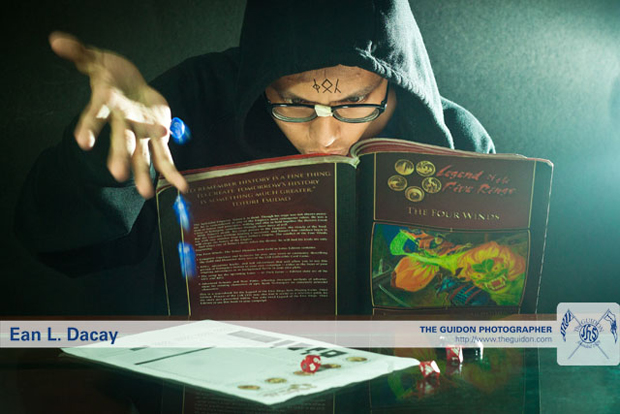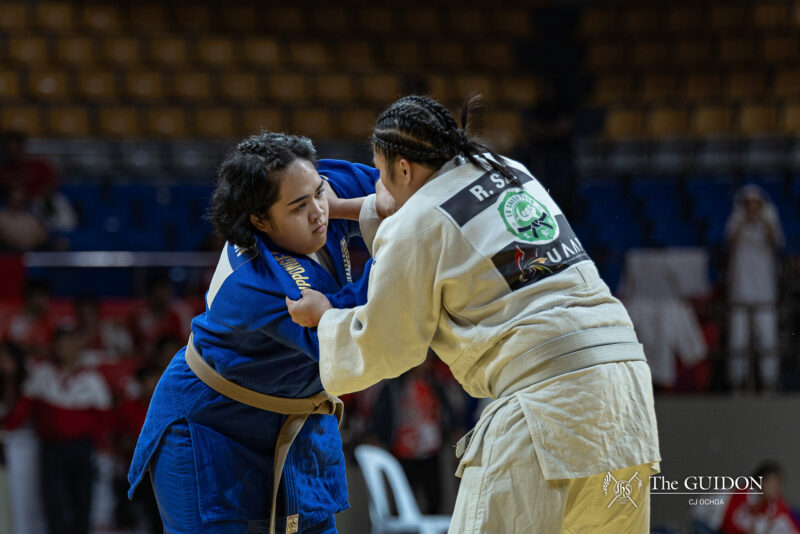A lone Japanese-looking diplomat sneaks through a dark corridor. On a mission from her superior, she treads carefully, searching for anyone who might have any information. The daimyo, or leader, of a rival clan is present in the castle, and she must find out why. A guard passes by, and notices her. Thinking quickly, she uses her fast-talking skills to attempt to weasel her way out of the situation…
“Use the cute dice!”
I sigh as my description is interrupted. The culprit is a younger, female staffmate, excited not only to find out the next event in the story, but also to see the cute, colorful dice roll around on my computer screen. I click a button, the dice roll, and I continue weaving my tale of adventure.
The game is called Legend of the Five Rings. Inspired by the classic Dungeons and Dragons, L5R is a pen and paper roleplaying game – essentially an interactive story using statistics and probabilities to determine the success of the players’ actions. I’m the Game Master (GM) here, and by virtue of my experience with the game – I’ve been running games, and playing in them for a few years – it’s my job to craft a story, to create an immersive world and to let the players live their created characters…
“I want to roll the cute dice!!!” It’s my job to roll the cute dice.
Role play
Before any are thrown, the characters in the story must be born from scratch and imagination. In L5R, characters come from the different esteemed clans of the fictional land, Rokugan. The Clans of Rokugan are numerous as they are powerful, with many samurai flying the banners of the Crab, Crane, Phoenix, or Scorpion clans.
The clan dynamic is one of the surefire ways to create tension and conflict in the story, and the available character classes highlight this difference. There are over ten classes available, catering to all players and styles. Aggressive people who hit anything that moves? Check. Sly planners, ambushers and poisoners? Check. Silver-tongued actors? Check.
Character creation is long and arduous. Statistics are recorded and upgraded and traits are chosen and fleshed out. The goal is to create the most unique character possible, an interesting person to interact with and move through the fictional game world.
My players, however, are more interested in the animal names, and their sounds. It suddenly hits me that at least one of them thinks that they’re going to be roleplaying actual animals. I slowly shake my head as she mimes Scorpion claws with her hands.
After about half an hour of consulting the rulebook, animal noises, and patient explanations, the characters are ready to play. They have created two shugenja, or magic users, and one courtier, or diplomat. I rub my hands together, and begin telling the story of the Topaz Championship.
Words flow from me like water. It’s been a while since I’ve done this, but as I set the scene, it becomes easier and more familiar. I’m describing a tournament – the Topaz Championship. Essentially an All-star Competition between the Great Clans, with many contests and prizes to be won, it’s a good place for action to occur, and it’s the standard opening I use for most of my campaigns.
However, the Game Master (GM) can only do so much – it’s the players that really drive the action and story forward. It’s how players react to the situation the GM crafts along with the endless possibilities, limited only by one’s mind that make the game interesting every time – no two sessions are exactly alike.
After my lengthy and dramatic description of the setting and the situation, I ask my players the core question of any roleplaying game. I give them the opening to influence the world and the story, to drive events forward and make their mark – I ask, “What do you do?”
More experienced players would usually “attempt to scout the area,” or “look for assassins,” or something equally aggressive, the first roleplaying decision my new players make is to… Look for a food stand.
Playing the odds
A question posed to me during the game went: “So essentially, we’re just playing something like a round-robin storytelling game?” I said yes, but with the caveat that it’s much more complicated than that. Up to this point, an essential element of the game hadn’t come into play yet.
After some gentle cajoling, the characters move to more pressing matters than gastronomic concerns. The two magic users find themselves involved in, of all things, a calligraphy contest. Meanwhile, the courtier is in the situation above – trying to glean information from a surly, reticent guard.
Here, dice rolls first come into play. Integral to any roleplaying game, dice rolls take into account statistics such as the character’s skills and traits and compare them to the difficulty of the task at hand. These rolls determine the success or failure of almost all the players’ actions within the game world.
What follows is an intense session of clicking, as the cute, animated dice on my laptop renders its results. This element of random chance leaves the players excited, watching each roll with anticipation and apprehension. When the dust clears, one of the magic users has emerged victorious in the calligraphy contest, and the stealthy courtier has gotten the information.
Leveling Up
The session eventually comes to a close, with the characters left in limbo for now – the two mages locked in spellcasting combat, and the persuasive diplomat reporting to her superior. Experience points, used to buy better statistics and traits, are given, and with that, the character sheets are tucked away and the rulebooks are closed.
Even as a self-proclaimed geek, I felt uncomfortable and slightly awkward with the idea of playing with complete novices—and girls, at that. They might have found the whole thing dumb, and thus I note with satisfaction that the players actually seem disappointed that we’re done.
I relish the exclamations that “we should do this again!” Though some felt that the session was a bit too short, the complaints were kept to a minimum, except for this:
“We should have used the cute dice more!!!”








